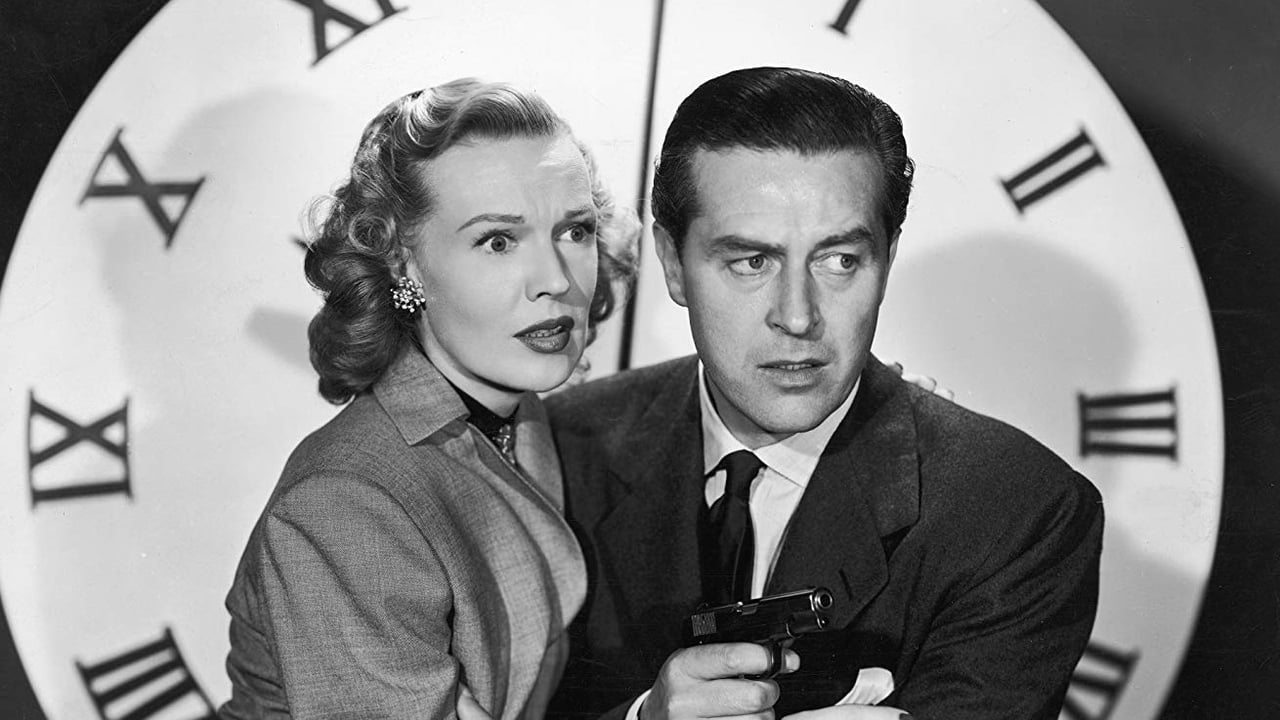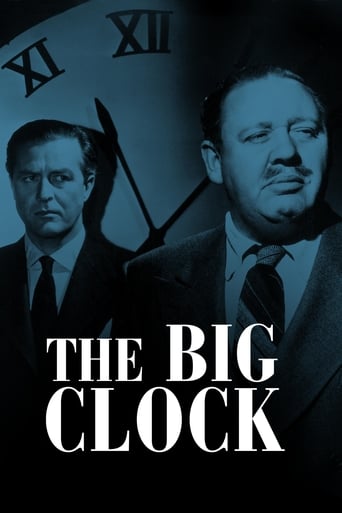

Crimeways magazine chief editor George Stroud (Ray Milland) is hiding from building security guards who are ordered to shoot on sight. He sneaks into the big lobby clock as the movie flashbacks to over thirty six hours earlier. George has been working non-stop. His wife Georgette (Maureen O'Sullivan) is getting ready for their long-delayed honeymoon with their 5 year old son. His tyrannical time-obsessed publishing tycoon boss Earl Janouth (Charles Laughton) and his mistress Pauline York (Rita Johnson) eavesdrop on his complaining about being overworked. Janouth pushes George to delay his trip and fires him when he refuses. George misses the train and his wife leaves on the trip without him. He spends the night drinking with Pauline who keeps suggesting blackmailing Janouth. Waking up the next day at her place, he sneaks out before Janouth arrives and kills her during an argument. The murder weapon has a connection to George. Janouth sends minion Steve Hagen to alter the crime scene as they try to frame George before the body is found. Janouth convinces George to return to lead an investigation for the magazine but soon realizes that it's him they're investigating.This may not be quite as well-celebrated as other classic noir. It's probably missing the sexy leading man who stood the test of time. Ray Milland is more of an everyman and no longer has the name recognition today. It does have the legendary Laughton as the big villain. Anybody familiar with No Way Out would recognize the story. The story is just as gripping coming from the same source material.
... View More"The Big Clock" is an example of an otherwise simple film made exceptional by masters at work, such as Ray Milland and Charles Laughton, but especially director John Farrow and his crew of technicians. Black and white photography, scenes gliding into each other, and taut direction of the action highlight this story of writer Milland working for publishing tycoon Laughton and getting caught up in a murder scandal. By way of flashback, we see how it all began, why Milland is on the run, and how clocks play a part in this sinister and fun film. With a solid supporting cast of George Macready, Henry(Harry) Morgan (who's spooky in a non-speaking role,) Maureen O'Sullivan (Farrow's wife in real life,) Rita Johnson (who I always liked in movies with her own little sparkle), and Elsa Lanchester (Laughton's wife in real life) in a scene-stealing role. In fact, Laughton seems to be the type of actor who doesn't emote much, but steals the scene from others in little ways. The plot unfolds and develops intricately but simply and it's delicious the whole way. This film really gets you in the mood for another film and another film, immersing yourself in the age of the old-fashioned movies they just don't make anymore. Period.
... View MoreCall me a disbeliever, but I find the plot of this movie utterly unrealistic. A pretty good one though; an action packaged, solidly built, suspense flick moving along at a sustained pace, as regular as the drumbeat in Ravel's Bolero. And its acting is the best, especially from Milland and Macready, while Laughton overplays his character a little bit. As for Lanchester, she's clearly enjoying each one of her moments in front of the camera, but it's Sullivan the one underused here, almost an afterthought—just see how almost nothing would have changed to the plot had they taken out her Georgette. Good cinematography also, especially with the overlapping shots, fade-outs and the group shots during the war councils in the blackboard room. An entertaining thriller, which I don't know why people insist in calling noir. In my book, a film noir is the application of the physical laws of entropy--everything in Nature tends to chaos, fragmentation and loss—to movies, so it's impossible for a noir to have a happy, or at least satisfying, ending. It always has to be bad, at least sad. If main characters end up alive and well, at least they got to be are sad because of losses or failures, even when there is no moral degradation--as it happened in Scarlet Street. Instead, the mood here is upbeat, even optimistic, so much so TBC could have easily been turned into a comedy--for ex., had the corpse disappeared from the lieu of the crime and had Pauline appeared alive & well at the end, because she didn't die after all, but went into hiding, after regaining consciousness, for fear of Janoth. In any case this film has the looks and the feel of a Hitchcock and I would have certainly thought so had not known beforehand that was Mia Farrow's dad the man behind the camera.When I say unrealistic, I'm referring to two basic plot elements which make it hard to digest. The first concerns not so much the jam Janoth finds himself in after the killing of his mistress, but the way he acts in such a circumstance. See, I have lived enough to realize that the higher your social standing is, the bigger the things you may get away with--including murder. Janoth should have known better and realized that what he does then is stupid, something showing his lack of awareness about his own place in society, and that he didn't need to do any police job. Someone as powerful as him would have never acted the way he does.In real life, after thinking about it for a minute, Janoth would have simply called police and reported that he has just found Pauline dead when coming to visit her. Then, not much later phones would have started ringing in offices of politicians, chiefs of police, members of the judiciary, and every effort would have been displayed to get him out of the jam and away from the lieu of the crime and from the case itself. (remember The Sting, when the "FBI brass" orders the local policeman to get the high profile hoodlum out of the place where two men have been just killed; and he was just a bandit!).That's what would have happened in TBC: the intervening policemen would have been ordered to get Janoth immediately out of that apt. and to keep complete silence about his presence there. And even if he had arrived to confess the killing, that wouldn't have made any difference; he would have been shielded anyway, on account of his importance for society. Before TV, or the Internet, press barons were of great importance for the political and economical establishments. And even after that; just remember the Life magazine photos of L.H. Oswald holding a rifle, after the Kennedy assassination, which went a long way into convincing public opinion he was really a gun nut. That's the kind of favor men like Janoth used to provide regularly to people in high places, so was anybody going to rock his boat just because of such a silly thing, for a dead woman? That's why if a man like him had ever found himself in such a bind he wouldn't have even lost his cool. All he had to do then was to make a few phone calls, inform the right people, and wait there to be taken out of the jam, so he may keep performing such valuable services. (In fact Stroud himself recognizes this when he says to his wife: Janoth could find dozens of alibis, I only have myself.) If anybody doesn't agree with such analysis I invite him, her, to see the Italian movie Indagine su un cittadino al di sopra di ogni sospetto (1970) where Gian Maria Volonté--of spaghetti western fame--plays a Chief of Homicides who murders his mistress and who starts intentionally leaving clues around, linking him to the crime, as if wanting to test how far he could go; if he can get away with murder, so to speak, because of his high post. Despite all his efforts at auto-incrimination his peers refuse to take him in. The film ends in a surreal scene, where his comrades gang up on him, forcing him to confess his...innocence. That was brilliant, much more realistic than what's shown here. Imagine Janoth leaving many clues linking him to the murder and watching with amusement how the police deploy every effort to lead the investigation in some other direction. That would have been a fun movie, but another one also.Another unrealistic element concerns Janoth's nasty "hobby" of firing people at a whim, but his employees still laboring happily under his orders. Believe me, I knew one of such places and that's no picnic; rather a living hell. But an entertaining flick anyway, if you overlook all what I said. 7/10.
... View MoreGeorge Stroud (Ray Milland) is a successful reporter at a magazine run by tyrannical Earl Janoth (Charles Laughton). Earl accidentally kills his wife but frames George for it (sort of). There's LOTS more going on but I wouldn't dream of spoiling it for potential viewers.Exceptional film noir. The script has many twists and turns and lots of rapid fire one liners that keep moving things along at a brisk pace. It's also filmed mostly in dark places or with darkness lurking within the picture--very appropriate for film noir. There's some stunning sets here too--it looks like this was made on a big budget. The acting is good too. Milland is excellent as a completely innocent man who gets caught up in the murder. You can see him fighting to control his fear and anger as things get worse and worse. Laughton, surprisingly, is just OK. He has a small beard which looks pretty stupid on him and seems ill at ease with the role. He's not terrible but he can do much better. In a small role is Elsa Lancaster (Laughton's wife) who is hilarious. This is one of the rare films where the humor mixes perfectly with the mystery. Also on hand is the then unknown Harry Morgan--who doesn't have a word of dialogue but conveys all his emotions through body language and looks on his face.This was remade in the 1980s as "No Way Out". That's not a bad movie but it can't hold a candle to this. This seems to be hard to find for some reason but it's well worth seeking out. Recommended.
... View More